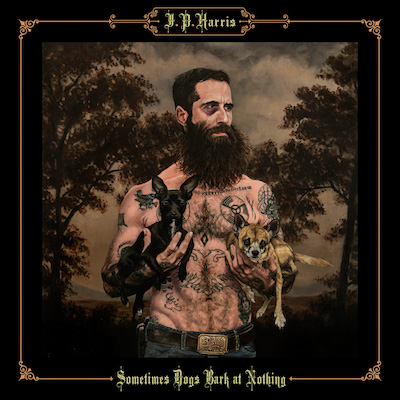BEN LEECE – NO WONDER THE WORLD IS EXHAUSTED; JP HARRIS – SOMETIMES DOGS BARK AT NOTHING: REVIEW
- Bernard Zuel
- Oct 11, 2018
- 4 min read
BEN LEECE
No Wonder The World Is Exhausted (Stanley Records)
JP HARRIS
Sometimes Dogs Bark At Nothing (Free Dirt Records)
Daddy, what did you do in the genre wars? Son, I stayed indoors.
Last week I took a ramble through Take Me To Town, a collection of new Australian acts playing Americana which is being launched at the Marrickville Bowlo on Saturday, and pondered how to squeeze people into the various categories within Americana, a genre that seems like a way of saying “I like country music” without having to associate with the beers-bros-big hats brigade.
This week I have two artists whose strategy for this conundrum is to avoid it altogether. Their choice is to say “I like country music and it sounds like this” and leave it up to us. And you know what, it may not get them played on radio here or in the States because those are creative dead zones, but it might build a few bridges between safe country and alternative country buyers.
Australian Ben Leece (whose lonesome-in-the-night Twenty One is a highlight of Take Me To Town, but does not appear on this debut album) draws from the 1970s and ‘80s in a way that is as unpretentious as his album cover.
It’s a full band sound that has the chunkiness of a rock quartet in Highway Not The Dream, and the pep and propulsion of a new wave outfit in A Hole (which is like Any Trouble covering Springsteen, as they were fond of doing), but the ability to lighten up for a pedal steel two-step such as Sunny Side.
It feels solid, in the sense of unfussed by being anything other than what it is, right from the opening Rebel Alone which has the straight work of Jason Isbell and the bruise of an oft-forgotten Australian pioneer Broderick Smith.
So Leece doesn’t tweak anything to suggest alt.rebelliousness, for example in the tender toughness of Apple Tree which might have had its ache amplified by a Ryan Adams acolyte to the point you’d begin to wonder about contrivance (though Villains does go the full Adams). Nor is he afraid to let something like Nothing (Not Anymore) hover between beefed up country and heartland rock in the way Tom Petty’s Heartbreakers would through, or to let Smoke Signals pull in the southern blues influences without getting turned outright into a power ballad.
It may be relatively early days with his songwriting, but this doesn’t feel like a learner album. Not least for his decision making. Letting the more uncool – for these days – tendencies sit where they fall in songs turns out to be a strength for Leece, a reminder that the dire state of the local country heavyweights comes down to lack of courage as much as poor imaginations.
JP Harris is not as modestly presented as Leece, this much can be told from his album cover: that beard, those tatts, that gothic overlay. Those dogs! If the background story on him as a quasi-hobo is true (unless he’s some Seasick Steve dream weaver), he’s earned all that in a life-and-three-quarters that might have had him still a carpenter but for some good luck and timing.
And in this album, his third, he doesn’t play down style, variety or – and this is the crucial bit – comfort with and joy in the intricacies (or, if you prefer, clichés) of the genre.
Playing in the ‘60s and ‘70s end of the pool, when he honky tonks, Harris pumps up the piano, doubles the drums and goes Bakersfield hard. When he does the wistful Leaving On A Jet Plane-like ballad, he sets the voice back a bit, pulls forward the acoustic and sets the tempo on idle. And if the moment calls for a late night saloon, the piano gets lonelier, the drums brush rather than snap.
In keeping with the outlaw aesthetic, he drinks, talks about drinking, talks about giving up drinking (and drugs); the road is a regular topic, setting or metaphor; the working day is at the mercy of someone else.
But he’ll also touch on the way women will be the victim of men because a man can, skews the perspective from strip bars and train cars to something more piquant than navel gazing, and uses women in the backing vocals – including the Watson Twins – to provide a Greek chorus to his behaviour, not just a sweetener.
Not as sweetly positioned as another recreator of a misty-hued past, Joshua Hedley (who is playing Out On The Weekend on Saturday & Oxford Art Factory on Sunday), Harris does do lived-in and a bit more living on the edge, which means he can say “damn right I wrote a song about a train” and be both funny and defiant.
You wouldn’t mistake what Leece and Harris are doing for anything but country, but it would be a mistake to try to slice or dice them into whatever specialist corner of country you prefer. Enjoy them instead, it’s really made easy for you here.

SPOTIFY:













Comments